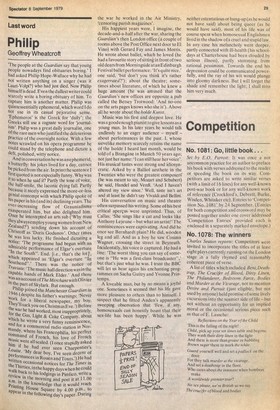Last word
Philip
Geoffrey Wheatcroft
'The people at the Guardian say that young people nowadays find obituaries boring.' I had asked Philip Hope-Wallace why he had not written anything on a singer (was it Lauri-Volpi?) who had just died. Now Philip himself is dead. Even the dullest writer could scarcely write a boring obituary of him. To capture him is another matter. Philip was quintessentially ephemeral, which word Ido not use in its casual pejorative sense. 'Ephemeros' is the Greek for 'daily'; the Greeks still use a cognate word for 'journalism'. Philip was a great daily journalist, one of the rare men who justified the deleterious Practice of the overnight notice. With a few notes scrawled on his opera programme he could stand by the telephone and dictate a deft, polished, witty notice.
And i n conversation hewas anephemerid, a butterfly: his jokes lived for a day, cannot be picked from the air. In print the sentence I first quoted is not especially funny. Why was It so when he said it? Partly the tone of voice, the half-smile, the laconic dying fall. Partly because it nicely expressed the more-or-less genial contempt with which Philip spoke of his paper in his (and its) declining years. The ever-increasing flow of Grauniadisms exasperated him, but also delighted him. Once he intercepted an arts sub ('Why must they alwaysemploy young women from New Zealand?') sending down his account of Christoff as 'Doris Godunov'. Other times he was less lucky. He finished dictating a notice: The programme had begun with an "In performance of Elgar's overture, In the South". End. [i.e., that's the log', which appeared as 'Elgar's overture "In Southend".' There was the notice of Tray iata: 'The music hall direction was in the capable hands of Mark Elder.' And there Was an account of The Merchant with Olivier in the part of Skylark. But enough. Philip joined the Manchester Guardian in 1946 (despite his father's warnings: 'Never Work for a liberal newspaper, my boy. They'll sack you on Christmas Eve.') Before the war he had worked, most inappropriately, for the Gas, Light & Coke Company, about Which he wrote a very funny reminiscence, and for a commercial radio station in Normandy, where his Francophilia, his perfect command of French, his love of French . m. him were all sealed. (I once stupidly asked hLouise.1111 he had ever seen Charpentier's 'My dear boy, I've seen dozens of Performances in Rouen and Tours.') He had written occasional notices for The Times in the Thirties, in the happy days when he could walk back to his lodgings in Pimlico, write a review. in the morning and post it at 11.00 .1n the knowledge that it would reach Printing House Square by 4.00 p.m., to appear in the following day's paper. During the war he worked in the Air Ministry, 'censoring parish magazines'.
His happiest years were, I imagine, the decade-and-a-half after the war, sharing the Guardian's then London office (a couple of rooms above the Post Office next door to El Vino) with Gerard Fay and James Morris.
He wrote about ballet, which he loved (he had a favourite story of sitting in front of two old dears from Morningside at an Edinburgh Festival ballet performance: 'It's quite nice,' one said, 'but don't you think it's rather exagerrated?'); about the theatre; sometimes about literature, of which he knew a huge amount (he was amused that the Guardian's new offices are opposite a pub called the Betsey Trotwood: 'And no-one on the arts pages knows who she is'). Above all he wrote about the holde Kunst.
Music was his first and deepest love. He was a good enough pianist to give lessons as a young man. In his later years he would talk endlessly to an eager audience — myself — about performances in the past. 1, whose sievelike memory scarcely retains the name of the Isolde I heard last month, would be told of a Brangane in Munich 50 years ago; not just her name: 'I can still hear her voice'. His musical tastes were strong and idiosyncratic. Asked by a Balliol aesthete in the Twenties who were the greatest composerg (he was meant to say, Mozart and Schubert) he said, Handel and Verdi. 'And I haven't altered my view since.' Well, taste isn't art and at least he didn't say Vivaldi and Bellini.
His conversation on music and theatre often surpassed his writing. Some of his best critical apergus were unprinted. Thus, of Callas: 'She sings like a cat and looks like Anthony Lejeune — but what an artist!! The reminiscences were captivating. And did he once see Bernhardt plain? He did, wooden leg and all. And as a boy he saw Cosima Wagner, crossing the street in Beyreuth. Incidentally, his voice is captured. He had a line: The worst thing you can say of someone is "He was a first-class broadcaster",' but that's just what he was. I trust the BBC will let us hear again his enchanting programmes on Sacha Guitry and Yvonne Printem PS. A loveable man, but by no means a joyful one. Sometimes it seemed that his life gave more pleasure to others than to himself. I suspect that he fitted Auden's apparently sweeping observation that 'Few, if any, homosexuals can honestly boast t hat their sex-life has been happy'. While he was neither ostentatious or hung-up (as he would not have said) about being queer (as he would have said), most of his life was of course spent when homosexual Englishmen lived in the shadow of a cruel and stupid law. In any case his melancholy went deeper, partly connected with ill-health (his schooldays at Charterhouse had been clouded by serious illness), partly stemming from rational pessimism. Towards the end his depression could be communicated powerfully, and the ray of his wit would plunge into gloomy darkness. But I will forget the shade and remember the light; I shall miss him very much.


































 Previous page
Previous page